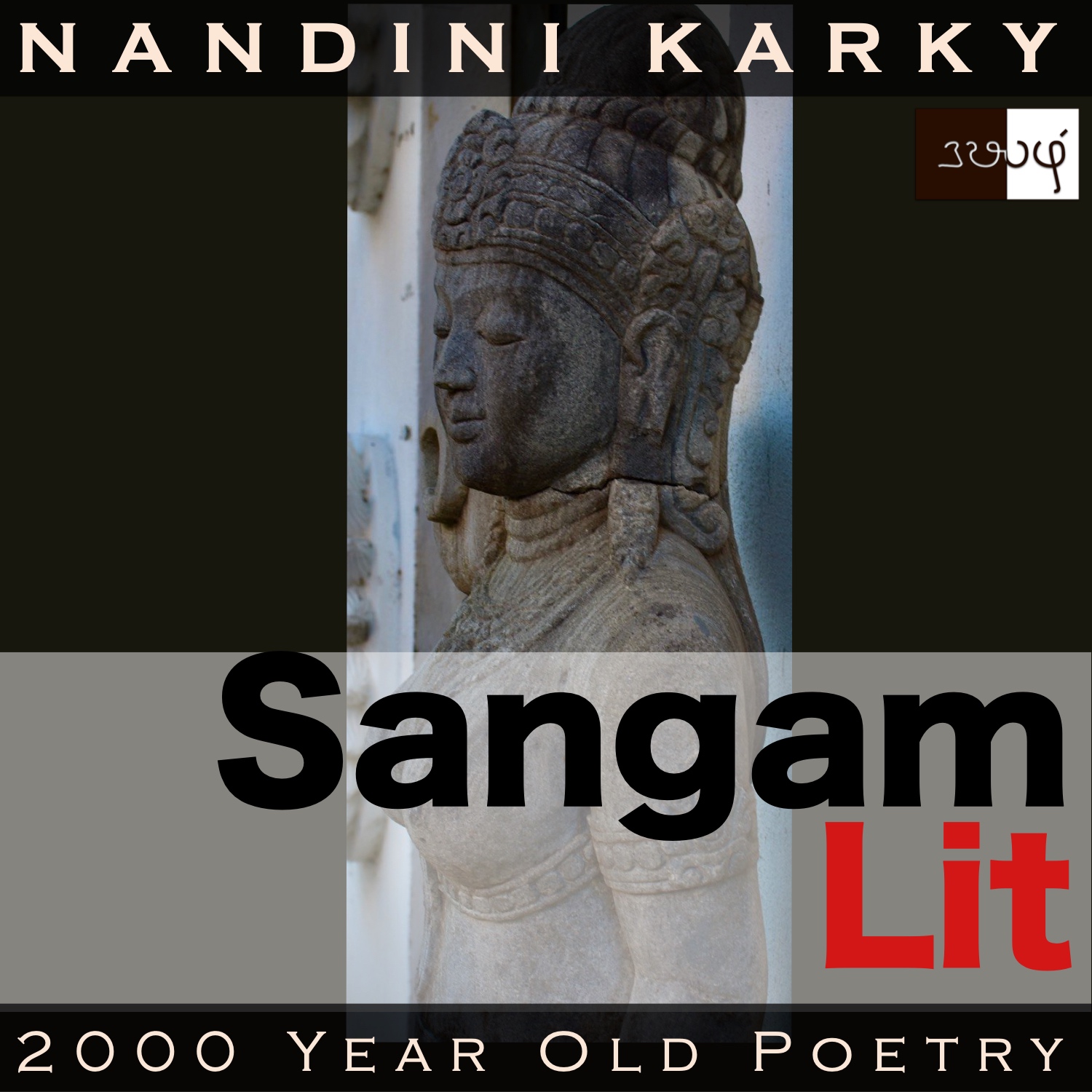Podcast: Play in new window | Download
Subscribe: Apple Podcasts | Spotify | Amazon Music | Android | iHeartRadio | TuneIn | RSS | More

In this episode, we relish the natural beauty of a hill country and the deep meaning that the image of a statue imparts, as portrayed in Sangam Literary work, Natrinai 201, penned by Paranar. The verse is set in the mountainous regions of ‘Kurinji’ and speaks in the voice of the man to his friend, in response to that friend’s advice about forgetting the lady, who has won the man’s heart.
‘மலை உறை குறவன் காதல் மட மகள்,
பெறல் அருங்குரையள், அருங் கடிக் காப்பினள்;
சொல் எதிர் கொள்ளாள்; இளையள்; அனையோள்
உள்ளல் கூடாது” என்றோய்! மற்றும்,
செவ் வேர்ப் பலவின் பயம் கெழு கொல்லித்
தெய்வம் காக்கும் தீது தீர் நெடுங் கோட்டு,
அவ் வெள் அருவிக் குட வரையகத்து,
கால் பொருது இடிப்பினும், கதழ் உறை கடுகினும்,
உரும் உடன்று எறியினும், ஊறு பல தோன்றினும்,
பெரு நிலம் கிளரினும், திரு நல உருவின்
மாயா இயற்கைப் பாவையின்,
போதல் ஒல்லாள் என் நெஞ்சத்தானே.
Situating the poem firmly in the hill country, the verse opens with the words ‘மலை உறை குறவன்’ meaning ‘a man from the mountain dwelling Kurava tribe’. Then, we encounter the word ‘காதல்’, which has not been isolated to mean a romantic relationship as in current-day Tamil, but is used to depict someone who is loved and showered with affection, even from a parent. If a leading lady is referred to as ‘மட மகள்’ in contemporary language, that would be an insult, for the word ‘மட’ has come to mean ‘foolish’ now. In this verse, ‘மட மகள்’ talks about an innocent maiden, indicating that innocence was a preferred trait in a woman of those days. There are many descriptions about a lady in this verse and the one that struck me was ‘சொல் எதிர் கொள்ளாள்’ meaning ‘a girl who cannot respond to another’s words’. Made me wonder if a woman was so filled with shyness that she could barely say a word in response to the man’s words to her. Once again, we meet with ‘கொல்லித் தெய்வம்’ and ‘இயற்கைப் பாவை’, both in reference to the statue of the goddess carved in the Kolli hills. There are a series of words – ‘இடிப்பினும்’, ‘கடுகினும்’, ‘எறியினும்’, ‘தோன்றினும்’ and ‘கிளரினும்’, proclaiming aloud many instances of the ‘even if’ clause. Thereafter, appears the word ‘மாயா’ meaning ‘undying’ and the combination of that clause and this word tells us there’s a strong feeling of persistence hiding in this verse. Let’s look deep into its heart to know more.
The man had met a lady in a mountain land he was traversing, and fell in love with her. He talks about his feelings to his friend and the friend decides to investigate more about the lady. The man responds to the friend, when he returns, saying, “ ‘That naive and adored daughter of the mountain dweller, is a girl who is impossible to obtain; she is protected by an impermeable guard; someone who cannot respond to your words; a young person lacking maturity. Do not hold her in your heart’, you say, my friend! On the western mountain ranges, guarded by the Kolli goddess, flows white cascades, surrounded by impeccable tall peaks, dotted with red-rooted jackfruit trees. Here stands the nature-carved statue of the Kolli goddess with a beautiful form, that dies not even if the winds assail it; even if the rains intensify and pour ceaselessly; even if the roaring thunder pounds on it; even if hardships many appear; and, even if the earth beneath quakes. Like that undying statue of the goddess, the lady leaves not from my heart, no matter what!” With these words, the man mentions the friend’s disapproval for the match and yet, conveys how the lady stands so firm in his heart.
Now, to unravel the nuances hiding in this verse! The first part of the poem opens with the words of the man’s friend, talking about how the girl is unsuitable and difficult to obtain for the man. She is the much-loved daughter of a fierce mountain dweller, who protects his daughter with a well-mounted guard. Beyond these external difficulties, the lady herself seems to be a mere slip of a girl, who cannot even respond with clarity, for such is her immaturity! The friend seems to have said these words to dissuade the man from thinking about the girl any further. The second part of the poem turns towards the depiction of the Kolli goddess. The Kolli hills in the current Namakkal district of Tamilnadu seems to have a firm place in the heart of Sangam poets. There are so many references to the rich natural wealth of this region and in this poem, there’s mention of the red-rooted jackfruit trees. Even today, the jackfruit from this region is famous for its sweetness and unique taste.
Fruit trees, tall peaks and white waterfalls are protected by the Kolli goddess in this land. The man says that no matter what natural calamity strikes, be it the pouring rains or dashing winds, be it the roaring thunder or unnameable hardships, why even if the earth quakes and breaks, the Kolli goddess would stand tall on that land. Likewise, the man concludes, the lady in his heart too, refuses to part away from him. Even though he sees the storm in the situation surrounding the lady, as pointed out by his friend, the man remains firm in his resolve to win the lady. The friend, seeing the man’s determination would give up trying to dissuade him and turn towards helping the man win the lady of this heart. Inspired by that unshakeable determination, let’s infuse our dreams with a steadfast will and make our own destiny!




Share your thoughts...